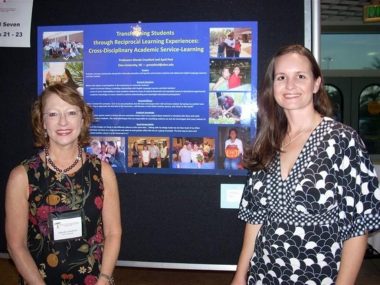
Academic service-learning at Elon combines work in the classroom (for credit) with real-world experience helping others through a programs run by nonprofit, educational or governmental agencies.
Here is what Elon researchers presented:
Pam Kiser
Mary Morrison
Carolyn Stuart
Stuart, Morrison and Kiser shared “lessons learned” in recent years as it made academic service-learning a more ingrained part of Elon University’s culture. For instance, the university organized a faculty advisory committee, developed the Service-Learning Faculty Scholars Program, and includes service-learning student research in a weeklong celebration of Elon academic achievement. The three researchers also identified challenges to “making service part of the ethos of the university:” the evolving definition of service-learning, the need for a strategic plan to further incorporate service-learning into the life of the University, and the implementation of a student scholars program in service-learning.
Glenda Crawford
April Post
Crawford and Post paired Elon students from an upper level education course with students from a Spanish conversational course. These teams “adopted” families of local middle and high school students who are just starting to learn English. One goal was to improve communication between Spanish-speaking families with the local school system, but the professors also wanted to measure the impact of the program on Elon students: Was there a stronger sense of social responsibility in solving problems unique to families of students who mostly spoke Spanish? Did they learn more about the ways different cultures view education? Crawford and Post found the answers to be positive.
Beth Warner
Judy Esposito
Warner and Esposito studied the effects of immersion service-learning experiences on educators themselves. “Immersion service-learning describes a course where students and faculty participate together in a service project for an extended period of time, working together, living together and learning together,” they write. This experience generally takes place in a location apart from the usual teaching site, such as another country, state, or community. Warner and Esposito found that professors were sometimes conflicted when trying to balance their own personal responses to immersion projects with their role as a class leader. “Specific challenges of the faculty role included enforcing student accountability of coursework, dealing with biases in assessment, and maintaining typical professional boundaries, especially in light of dealing with one’s own responses to being in a different culture, serving in impoverished areas, and witnessing the atrocities of poverty and oppression,” they write.
Janice Richardson
Ayesha Delpish
Richardson and Delpish studied how college students studying to become math teachers learned from their experience answering calls to a homework hotline for middle and high school math help. The researchers identified several challenges and opportunities: 1.) Without the ability to use visual prompts, Elon students had to find innovative ways of teaching to younger students over the phone; 2.) University students revealed a “newfound awareness” of differences in learning style between various ages and cultures; 3.) Elon students also found they would need to interact with parents who called for help.
Mary Knight-McKenna
Alexa Darby
Knight-McKenna and Darby are still collecting and analyzing information. Their research explores teacher candidates’ views on Title I (high poverty) schools during a practicum and/or academic service-learning experience. Data was collected with surveys and focus group interviews in order to learn how candidates perceive student achievement, parental participation, and teachers’ attitudes in Title I schools.
Pam Kiser
(With Glenn Bowen from Western Carolina University)
Kiser and Bowen studied the impact of faculty fellows programs on educators at their respective universities. They found there were numerous benefits for faculty, including a stronger sense of colleagueship with other faculty, more collaborative relationships with students, and opportunities for scholarly work related to scholarship of teaching and learning. One hundred percent of faculty at both universities reported that they had encouraged other colleagues to consider service-learning as a teaching approach.


